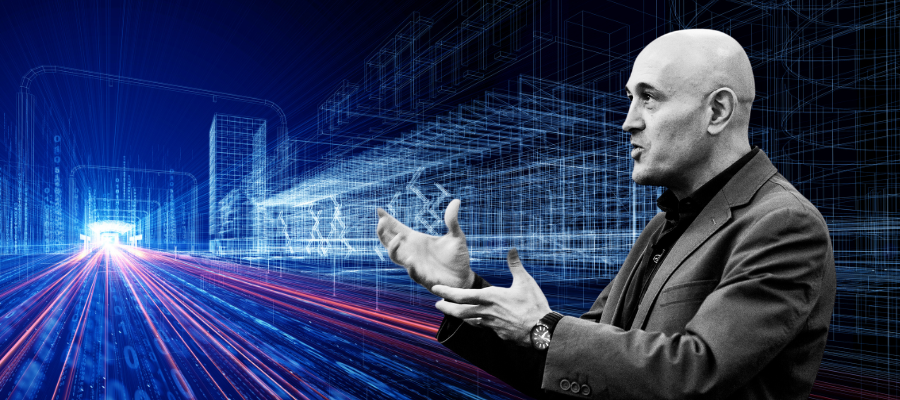🕒 Article read time: 2 minutes
The future of transport and autonomous vehicles, according to renowned theoretical physicist, Jim Al-Khalili

When Jim Al-Khalili talks, people listen. As well as a multiple award-winning science communicator, writer, broadcaster and leading academic making fundamental contributions to theoretical physics, he is a regular presenter of TV science documentaries, such as the Bafta nominated Chemistry: A Volatile History, and hosts the long-running weekly BBC Radio 4 programme, The Life Scientific.
He recently spoke at Logistics UK’s ITT Hub event in Farnborough, impressing the audience with his delivery, insight and approachability.
We caught up with him after the event to talk more about the future of transport and autonomous vehicles…
Realistically, how far away is the widespread adoption of self-driving cars and autonomous vehicles? Is the revolution guaranteed?
The revolution is guaranteed, yes, in the sense that it is inevitable that this technology will arrive, but fully autonomous vehicles I would say are still 10-20 years away.
How will manufacturers get past people’s anxieties around accidents and prove that they are in fact safer? How long will it take to convince them that computers are better drivers than humans?!
It will happen gradually with dialogue and transparency. But the same happens with all new technologies. We don’t worry anymore when we’re told our plane is flying in autopilot. There are many examples throughout history where we have put our faith (and our lives) in the hands of technologies that replace humans. If AI-driven vehicles are safer than human-driven ones, then people will be persuaded. We are a remarkable species at adapting to new tech.
How will the design of vehicles change now that they will only cater for passengers?
I guess we can look at how science fiction writers and Hollywood have depicted them, which is probably not so far from what will happen. We won’t need a steering wheel, that’s for sure. And the windows could double as screens showing us information as well as transparent views of the outside world. Passengers will not necessarily need to see where they are going, in the same way that I tend not to constantly look out of a train or plane window.
What will come first, driverless trucks or driverless cars? Why?
If the technology is available for one and there is a commercial incentive, then it will happen quickly for all road vehicles I would say. This is not like other transport tech where the type of vehicle plays a role, like hydrogen fuel cells in trucks and buses before cars, due to their current cumbersome size.
How will driverless trucks benefit the freight industry and how big an effect will autonomous vehicles have on freight and the movement of goods?
Well, one possibility is that the necessary tight regulations about how many hours that long-distance truck drivers are allowed to do per day or in one stint to avoid concentration lapses and tiredness is no longer an issue if the trucks are autonomous (with a driver still on hand, but who is less in volved in having to concentrate on the driving itself).
Can autonomous vehicles reduce pollution? How?
It’s not obvious to me that there is a direct or strong correlation between autonomous vehicles and the green agenda. That is far more connected to the type of vehicle, the nature of the fuel and the wider infrastructure. A car driven by a computer rather than a human will still need the same engine and structure. Taking away the steering wheel for example has no effect on how environmentally friendly it is.
Who are the biggest champions of autonomous vehicles?
Well, I don’t think it’s the transport industry yet. It is still focussing – rightly – on electrification. So, it is the robotics industry, the AI researchers and the other developers of the technology who are most engaged, as well as the larger visionary organisations such as Google etc.
In your opinion, how will driverless vehicles reshape the way the world works?
Like any revolutionary new technology, I suspect it will be in unexpected ways. No doubt there are people who are thinking about this, but I am not best placed to comment. I would just say that such new technologies don’t appear in isolation. The world will change in much bigger ways due to the development of AI, robotics and automation, than just because of driverless cars. For instance, there may be fewer people travelling in cars overall if remote working continues to develop, with virtual reality and augmented reality advances, as well as AI taking over those jobs we are currently all commuting to work to do!
What will an autonomous future look like and what are the main concerns to be overcome going forward?
The main challenges are of course the same as those with the development of AI in general, but even if these are overcome there will still remain the challenge of public acceptability and trust. Like most people, I guess my vision of an autonomous future is the same as that envisioned by futurists, science fiction writers and, dare I say again, Hollywood. These may be completely wrong of course, but I don’t personally have any better way of predicting the future than anyone else.
*www.logistics.org.uk/campaigns
Published On: 18/05/2023 16:00:00

Comments Section
If you are a Logistics UK member login to add comments.